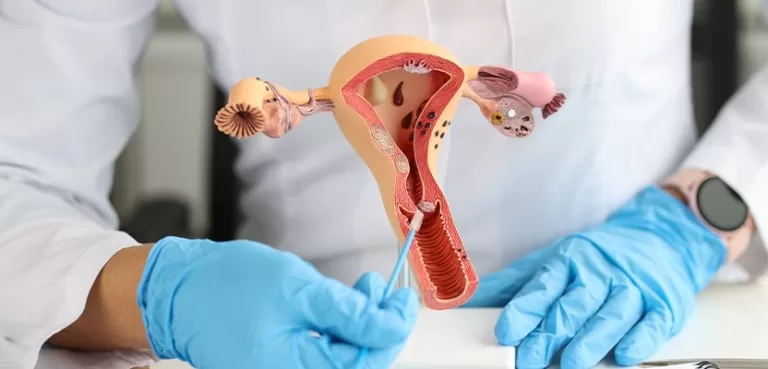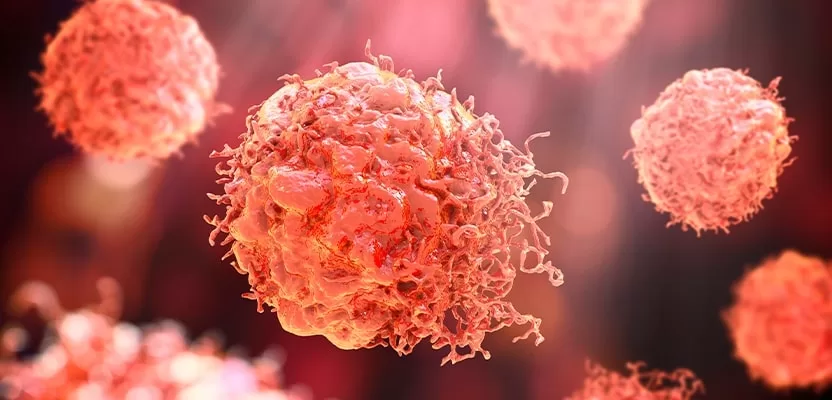+90 533 813 89 77
info@bookingforhealth.com
Endometrial Cancer
Endometrial cancer, also known as uterine cancer, is a type of cancer that begins in the lining of the uterus, called the endometrium.
It is the most common type of cancer of the female reproductive tract. Endometrial cancer is most commonly found in postmenopausal women, but it can occur at any age.
There are different types of endometrial cancer, the most common one is called endometrioid adenocarcinoma, which arises from the glandular cells of the endometrium. Other types include serous carcinoma, clear cell carcinoma, and carcinosarcoma.
Each type has different characteristics and may require different treatment approach. Endometrial cancer is typically a slow-growing cancer and early detection is key to improve the chances of cure. It has a relatively comfortable process compared to other types of cancer. Mostly, it can be treated with surgery. In a very small group of patients, radiotherapy and chemotherapy may be required.

Endometrial Cancer: Symptoms and Causes
Uterine cancer symptoms are mostly seen as vaginal bleeding. It is known that bleeding in menopausal is often associated with this disease.
If women experience irregular or excessive bleeding during their menstrual period, this may also be one of the symptoms of uterine cancer. In an advanced uterine cancer disease, the following symptoms are likely to be seen.
- Pelvic pain
- Weight loss
- Urinating frequently
- Pain when peeing
- Bleeding after menopause
It’s important to note that these symptoms can also be caused by other illness or conditions, and they do not necessarily indicate the presence of cancer. However, if a person experiences any of these symptoms, it’s important to consult with a doctor to rule out endometrial cancer or other things.
There are several risk factors that can increase a woman’s likelihood of developing endometrial cancer. Some of the most common include below:
- Obesity
- Diabetes
- Hypertension
- Use of Tamoxifen
- Family history
It’s important to note that endometrial cancer is typically a slow-growing cancer, and early detection is key to improve the chances of cure. Women should be aware of the symptoms and risk factors of endometrial cancer and consult with their doctor if they experience any unusual vaginal bleeding or other symptoms.

Endometrial Cancer: Treatment
Surgery is often preferred in the treatment of uterine cancer. Depending on the case, radiotherapy, chemotherapy, hormone therapy or immunotherapy are also used. Depending on the patient’s condition, one or more of them are applied together.
In the treatment of uterine cancer, surgery is performed after a stage called frozen. The aim here is to examine the uterus pathologically. Chemotherapy is administered before or after surgery. It is given after surgery to prevent cancer from reappearing, while it is performed before surgery to shrink the tumor.
Radiotherapy is applied to eliminate any cancer cells remaining in the patient after the surgical procedure. Similar to chemotherapy, it is also used for tumor shrinkage to aid surgery.
Hormone therapy in uterine cancer is used to control the patient’s hormone level and to stop the spread of the cancer. It is usually applied together with chemotherapy.It’s important to note that treatment options and recommendations may vary depending on several factors including the stage and grade of the cancer, the patient’s age and overall health, and personal preferences.
Differences Between Cervical Cancer and Endometrial Cancer
Cervical cancer and endometrial cancer are both types of illness that affect the female reproductive system, but they occur in different parts of the reproductive tract.
Cervical cancer occurs in the cervix, which is the lower part of the uterus that connects to the vagina. It is caused by the human papillomavirus (HPV) and is typically diagnosed in women over the age of 30. Symptoms of cervical cancer may include abnormal vaginal bleeding, pelvic pain, and pain during intercourse.
Endometrial cancer occurs in the lining of the uterus, called the endometrium. It is typically diagnosed in women over the age of 50. Symptoms of endometrial cancer may include abnormal vaginal bleeding or discharge, pelvic pain, and weight loss.
Both cervical and endometrial cancer can be prevented through regular screenings and vaccinations, and treated with surgery, radiation therapy, and chemotherapy. It is important for women to receive regular gynecological exams and be aware of any unusual symptoms in order to catch these cancers early.